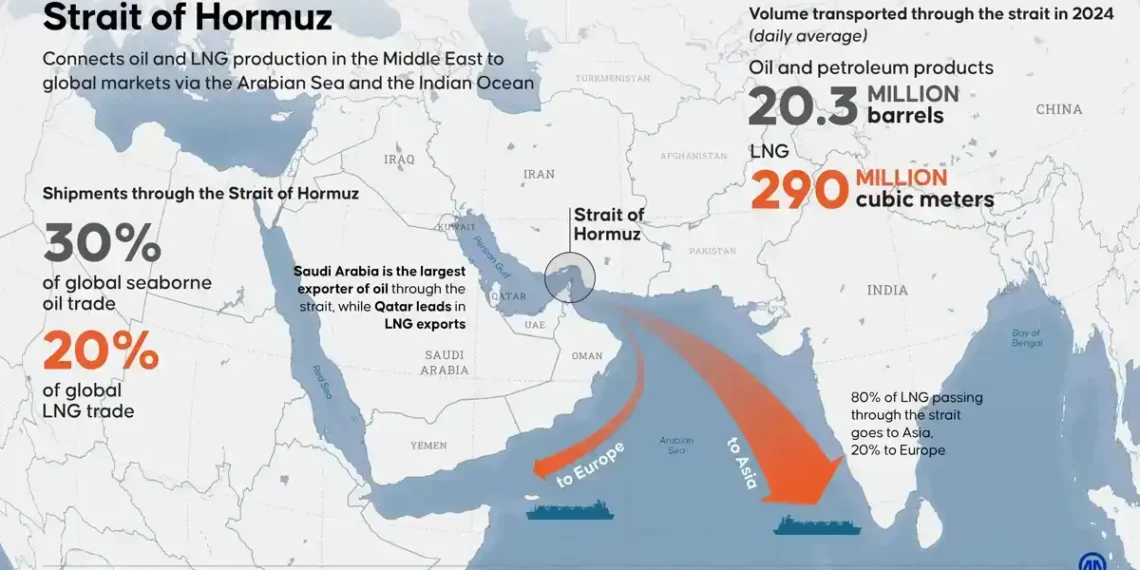Why the Strait of Hormuz Matters—and Why the U.S. Is Bracing for Iran’s Next Move
After U.S. airstrikes hit three Iranian nuclear facilities over the weekend, fears of Iranian retaliation are rising—and one key area of concern is the narrow stretch of water known as the Strait of Hormuz. It’s more than just a geographic chokepoint—it’s a global lifeline for energy, and any disruption there could ripple across international markets.
U.S. Strikes a Turning Point in Conflict
On Sunday morning local time, the United States launched direct military strikes on Iranian nuclear sites—a move President Trump described as an effort to “neutralize a threat posed by the world’s number one state sponsor of terror.”
While the broader conflict between Israel and Iran has simmered for years through proxy battles and covert actions, these strikes marked the first time U.S. forces intervened openly in the escalating war. And now, all eyes are on how Iran might respond.
The Strait of Hormuz: A Global Energy Lifeline
The Strait of Hormuz may only be 21 miles wide at its narrowest point, but its strategic importance is immense. It connects the Persian Gulf to the Gulf of Oman and, ultimately, the Arabian Sea—making it the key artery for oil exports out of the Middle East.
According to the U.S. Energy Information Administration (EIA), more than 20 million barrels of oil per day flow through the strait. That’s roughly one-fifth of all petroleum consumed worldwide and over a quarter of all global maritime oil trade. In 2024 alone, Saudi Arabia accounted for nearly 40% of those exports.
But it’s not just oil—roughly 20% of global liquefied natural gas (LNG) shipments also pass through the strait, most of them from Qatar.
Iran controls the northern side of the waterway, while Oman and the UAE control the southern banks. This gives Tehran a powerful, if controversial, tool: the threat to shut down or obstruct the strait.
What Happens If Iran Tries to Block It?
That possibility is far from hypothetical. Iran has long used the threat of closing the Strait of Hormuz to push back against Western sanctions and pressure. And in the wake of Sunday’s airstrikes, the concern has reemerged with force.
While Saudi Arabia and the UAE have some overland pipelines to bypass the strait, their capacity is limited. According to the EIA, if oil flow through the strait were cut off, countries like China, India, Japan, and South Korea—which rely heavily on Middle East energy—would be hit hardest.
Even in the U.S., which imports less oil from the region than in the past, prices at the pump could spike due to shaken global markets. In 2024, only 7% of U.S. oil imports came through the strait, but even a minor disruption can send shockwaves through pricing and supply chains.
Rubio: Blocking the Strait Would Be “Suicidal” for Iran
On Sunday, Secretary of State Marco Rubio didn’t mince words when asked about the risk of Iran blocking the waterway.
“If they do that, the first people that should be angry about it are the Chinese government, because a lot of their oil comes through there,” Rubio said on Face the Nation. “It would be a suicidal move… because the world would come against them if they did that.”
He pointed out that mining the strait—placing naval explosives to damage or sink tankers—would not only harm Western countries, but also alienate Iran from the very nations it has tried to align with diplomatically.
The U.S. Navy Is Already in Place
The United States is not leaving anything to chance. Its 5th Fleet, headquartered in Bahrain, has long been tasked with protecting freedom of navigation in the Strait of Hormuz. With tensions escalating, the fleet’s presence may now serve as both a deterrent and a rapid response force should Iran attempt to disrupt shipping lanes.
What Comes Next?
With a ceasefire now reportedly in place between Israel and Iran—brokered with U.S. involvement—there’s hope for de-escalation. But the risk of retaliatory action remains real, and the Strait of Hormuz could be one of the first places it plays out.
A move by Iran to choke off energy flows through the strait would send oil prices soaring, destabilize economies, and possibly drag multiple countries deeper into conflict. For now, the world is holding its breath—and watching that narrow stretch of water.
This article was rewritten by JournosNews.com based on verified reporting from trusted sources. The content has been independently reviewed, fact-checked, and edited for accuracy, neutrality, tone, and global readability in accordance with Google News and AdSense standards.
All opinions, quotes, or statements from contributors, experts, or sourced organizations do not necessarily reflect the views of JournosNews.com. JournosNews.com maintains full editorial independence from any external funders, sponsors, or organizations.
Stay informed with JournosNews.com — your trusted source for verified global reporting and in-depth analysis. Follow us on Google News, BlueSky, and X for real-time updates.














